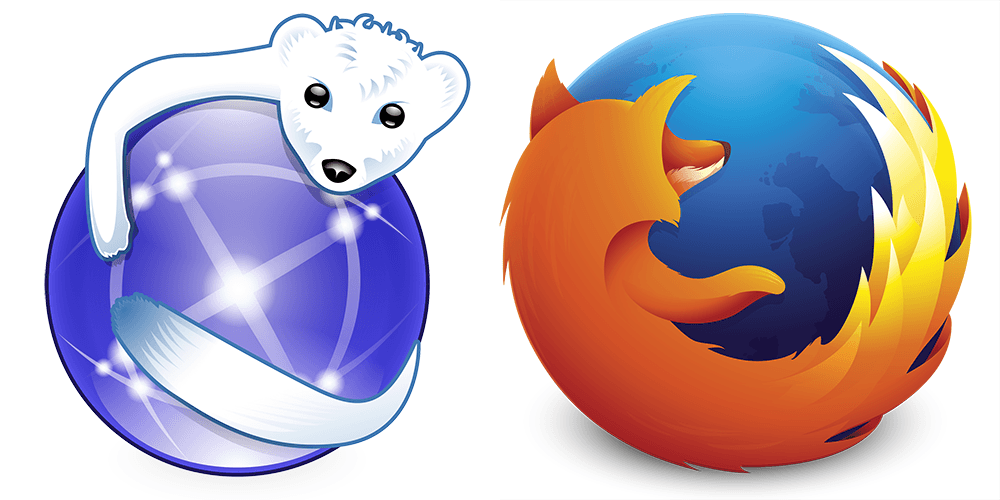GNUzilla is the GNU version of the Mozilla suite, and GNU IceCat is the GNU version of the Firefox browser. Its main advantage is an ethical one: it is entirely free software. While the Firefox source code from the Mozilla project is free software, they distribute and recommend nonfree software as plug-ins and addons. Also their trademark license imposes requirements for the distribution of modified versions that make it inconvenient to exercise freedom 3.
Privacy protection features
A fully free, simple, and lightweight operating system. You've reached the website of Parabola GNU/Linux-libre. The Parabola project is a community-driven, 'labour-of-love' effort to maintain a 100% free (as in: freedom) operating system distribution that is lean, clean, and hackable. As an update to this Iceweasel is no longer available. Attempting to install it will instead install Firefox. The package for Iceweasel was discontinued in February of.
- LibreJS: GNU LibreJS aims to address the JavaScript problem described in Richard Stallman's article The JavaScript Trap.
- Https-Everywhere: Extension that encrypts your communications with many major websites, making your browsing more secure.
- SpyBlock: Blocks privacy trackers while in normal browsing mode, and all third party requests when in private browsing mode. Based on Adblock Plus.
- AboutIceCat: Adds a custom “about:icecat” homepage with links to information about the free software and privacy features in IceCat, and checkboxes to enable and disable the ones more prone to break websites.
- Fingerprinting countermeasures: Fingerprinting is a series of techniques allowing to uniquely identify a browser based on specific characterisics of that particular instance (like what fonts are available in that machine). Unlike cookies, the user cannot opt-out of being tracked this way; so the browser has to avoid giving away these kinds of hints.
Downloads
Official releases of IceCat
They are available from ftp.gnu.org, or any GNU mirror. Please use a mirror if possible. Besides the sources, binary packages for GNU/Linux (32 and 64 bit) are available.
IceCat is generated from Firefox with the scripts available in the Git repository of GNUzilla.
Note that building binary packages for Windows and MacOS currently requires nonfree software, so we no longer distribute binary packages for those platforms.
Free add-ons and plugins
- We maintain a list of free addons.
- GNUzilla runs its own plugin finder service at
gnuzilla.gnu.org.
Language packs
You can find langpacks for IceCat on ftp.gnu.org, in the langpacks directory for a given release.
These langpacks are generated automatically from the original Firefox ones, if you notice problems in your locale, please let us know at the <bug-gnuzilla@gnu.org> mailing list.
Online help and documentation

Community driven manuals are available at LibrePlanet.
Mailing lists
The GNUzilla project uses a number of mailing lists, as follows:
- help-gnuzilla (archives): general discussion and requests for help about GNUzilla and IceCat;
- bug-gnuzilla (archives): bug reports and feature requests for GNUzilla and IceCat;
- gnuzilla-dev (archives): development discussion around GNUzilla and IceCat.
To subscribe to the mailing lists, you may either use the mailman web interface (click on each list name and follow the instructions), or send an empty email with a Subject: header line of just “subscribe” to listname-request@gnu.org, replacing listname with any of the list names above (e.g. help-gnuzilla).
Found a bug? Have a suggestion? Please report it to the bug-gnuzilla list, trying to specify all the information that could be involved: platform, program version (the command icecat --version will report this), and build tools version if building from source code. Please report both the observed and the expected behaviors.
Getting involved
Development of IceCat, and GNU in general, is a volunteer effort, and you can contribute. For information, please read How to help GNU. If you'd like to get involved, please join our mailing lists and say hi!
- Maintainers
- The GNUzilla project is currently maintained by Ruben Rodriguez, Amin Bandali, Mike Gerwitz, and Mark H. Weaver. Please use the mailing lists for contact.
Origin of the name
The name “IceCat” was coined to show our relationship to the Mozilla Firefox browser. Ice isn't Fire and a Cat isn't a Fox, so it is clearly a different package (we don't want Mozilla blamed for our mistakes, nor cause confusion with their trademarks), but is equally clearly intimately related (of course nearly all of the work comes from the Mozilla foundation effort, so we want to give credit).
The gNewSense BurningDog browser and the Debian IceWeasel browser are similarly derived from Firefox, also with the intent of being free software. Technically, however, these projects are maintained entirely independently of IceCat. (Previously, this GNU browser project was also named IceWeasel, but that proved confusing.)
About GNU and the GNU Philosophy
The GNU Project was launched in 1984 to develop a complete Unix-like operating system which is free software—free as in freedom, not price. Its principal sponsor is the Free Software Foundation.
The free softwarephilosophy is the root and motivation of the guidelines and goals ofthe whole free software movement, a worldwide community.
Please join us!
Translation(s): English - Español - Français - Italiano - Русский
Mozilla Firefox, or simply Firefox, is a free and open-source web browser developed by the Mozilla Foundation and its subsidiary, Mozilla Corporation. Firefox is available for many Operating Systems, on desktop and mobile.
Contents
- Installing Firefox
- Profile
Installing Firefox
From Debian packages
On DebianStable, Install the firefox-esr package.
This installs the Extended Support Release of Firefox. ESRs are not updated with new features every six weeks. They are instead supported for more than a year, updating with major security or stability fixes.
Support for languages other than English is available in packages named firefox-esr-l10n*.
On DebianUnstable, to install the Release version of Firefox, install the firefox package.
From Mozilla binaries
Mozilla distributes ready-to-use Firefox binaries for Linux on their website:
https://www.mozilla.org/en-US/firefox/ - Release
https://www.mozilla.org/en-US/firefox/channel/desktop/#beta - Beta
https://www.mozilla.org/en-US/firefox/channel/desktop/#nightly - Nightly
To install any of them on DebianStable:
- Download the Firefox version you want directly from the official website
- Uncompress the archives:
in the /opt directory (system-wide installation - requires Root privileges)
- in your home directory (install only for the current user)
Create a file firefox-stable.desktop (replace stable with beta or nightly if needed) with the contents below:
in the /usr/share/applications directory (system-wide installation - requires Root privileges)
in the ~/.local/share/applications directory (install only for the current user)
Replace /opt/firefox with the path to the directory where you extracted the archive.
If you want to be able to launch Firefox from a CommandLineInterface, create a symlink to the firefox executable in /usr/local/bin/. For example: sudo ln -s /opt/firefox/firefox /usr/local/bin/firefox
If you want to use your manually installed Firefox as the default DebianAlternatives browser (x-www-browser), run sudo update-alternatives --install /usr/bin/x-www-browser x-www-browser /opt/firefox/firefox 200 && sudo update-alternatives --set x-www-browser /opt/firefox/firefox
From Flathub
Mozilla provides an official FlatPak at FlatHub.

If you haven't already set up flatpak, run
Install it:
Run it:
If you have added /var/lib/flatpak/exports/bin to your PATH, you can also run it with the command

Iceweasel Kali Install
If you want to use your Firefox flatpak as the default DebianAlternatives browser (x-www-browser), run
Flatpaks don't support native messaging. Therefore, add-ons which rely on it such as KeePassXC Browser don't work. A workaround for KeePassXC is described in the Flathub forum. Since the KeePassXC's socket has been renamed in KeePassXC 2.6, for this version you need to tweak the solution as described in comment #3
Using snap
Mozilla provides an official Snap package for Firefox:

If you haven't already installed snapd, run
Install it:
Run it:
Snap packages don't support native messaging. Therefore, add-ons which rely on it such as KeePassXC Browser don't work. Since KeePassXC's server socket has been renamed, you need to tweak the workaround as explained in https://discourse.flathub.org/t/how-to-run-firefox-and-keepassxc-in-a-flatpak-and-get-the-keepassxc-browser-add-on-to-work/437/3?u=jro
Iceweasel Download Kali Linux
Profile
Firefox user data (your home page, toolbars, installed extensions, passwords, bookmarks...) are stored in a profile folder. (See this Mozilla support page).
~/.mozilla/firefox/: location of profile directorie, for flatpak installations, it is ~/.var/app/org.mozilla.firefox/.mozilla/firefox/
/etc/firefox-esr/default/profile/: Files to copy to newly created profiles. Use this location to preconfigure Firefox.
~/.mozilla/firefox/*.*/user.js: firefox preferences for each profile. These preferences can also be set from the browser interface, or from the about:config page.
/etc/firefox-esr/firefox-esr.js: default Firefox system-wide preferences. Each profile/user can override these preferences.
You can start the Profile Manager from Firefox or from the command line: firefox --no-remote -P
* If firefox refuses to start with the existing profile because the version of firefox launched is supposedly not compatible, you can try removing the file compatibility.ini within the profiles directory. You may want to back up the profiles directory first, in case of an actual incompatibility.
or, if you are using flatpak
Disabling automatic connections
Firefox makes a number of automated connections to Mozilla's (and other's) servers without explicitly asking the user for approval. Mozilla documents that list in the How to stop Firefox from making automatic connections page. Here is a table of the above parameters and how Debian diverges from the upstream default:
Iceweasel Ppc
The table below may be out of date. It was created on 2018-09-23 from the upstream page by looking at an empty profile on Firefox ESR 60.2.1esr-1. Mozilla's documentation itself may be missing some parameters as well.
Feature | Parameter | Mozilla | Debian |
Auto-update checking | app.update.enabled | true | false |
Auto-update search engines | browser.search.update | true | true |
Blocklist updating | extensions.blocklist.enabled | true | true |
Anti-phishing and malware protection lists | browser.safebrowsing.downloads.remote.enabled | true | true |
Tracking protection | privacy.trackingprotection.enabled | false | false |
Secure website certificates (OCSP) | security.OCSP.enabled | 1 | 1 |
Link prefetching | network.prefetch-next | true | true |
DNS prefetching | network.dns.disablePrefetch | false (means enabled) | false |
Speculative pre-connections | network.http.speculative-parallel-limit | 6 | 0 |
Add-on list prefetching | N/A (can't be turned off) | enabled | enabled |
Extensions update check | extensions.update.enabled | true | true |
Live Bookmarks updating | N/A (user-enabled) | none by default | none by default |
Downloads restarted | N/A (user-enabled) | N/A | N/A |
Search plugin icon loading | ? | ? | ? |
Firefox Sync | ? (needs user to opt-in) | N/A | N/A |
Snippets | browser.aboutHomeSnippets.updateUrl | enabled | enabled |
Geolocation for default search engine | browser.search.geoip.url | enabled | enabled |
'What's new' page | browser.startup.homepage_override.mstone | enabled | enabled |
Add-on metadata updating | extensions.getAddons.cache.enabled | enabled | enabled |
Telemetry | browser.selfsupport.url | N/A? | N/A? |
Telemetry | toolkit.telemetry.enabled | false in releases, true in nightly | false? there are other parameters |
toolkit.telemetry.coverage.opt-out | not present (means enabled) | not present | |
OpenH264 plugin download | media.gmp-gmpopenh264.enabled | true | false |
WebRTC | multiple | enabled | enabled? |
Send Video To Device | browser.casting.enabled | false | N/A? |
Captive portal detection | network.captive-portal-service.enabled | true | true |
Loopback connection | can't be disabled | disabled on Linux | disabled |
Other projects aim at improving security and privacy in Firefox:
TorBrowser - Firefox-based Web browser aimed at defending against tracking, surveillance, and censorship.
https://github.com/pyllyukko/user.js - Firefox configuration hardening
https://gitlab.com/anarcat/scripts/blob/master/firefox-tmp - Anarcat's firefox-tmp script
Iceweasel Kali
Plugins
The only plugin supported by Firefox is FlashPlayer (NPAPI version). Other plugins are no longer supported.
Iceweasel Kali
Plugins are found at /usr/lib/mozilla/plugins (system wide) or ~/.mozilla/plugins (current user only).
Troubleshooting
Firefox is consistently crashing on a website:
Run firefox in safe mode (extensions and themes disabled): firefox --safe-mode
- If this fixes the problem, one of your extensions is the root cause, if not:
Create a new firefox profile: firefox --no-remote -P (or from the about:profiles page)
No sound:
Go through the general Sound troubleshooting steps. If this fails, reinstall alsa and pulseaudio:
Iceweasel
From Debian Etch through Debian Jessie (9th June 2016), Mozilla Firefox was not available in Debian with the official name or branding. Instead, Debian shipped a free-software version rebranded by Debian, named Iceweasel. This fork was maintained because of a disagreement with Mozilla regarding backporting of the security fixes to DebianStable, and as the result could not use trademarked Mozilla artwork.
Starting from DebianStretch, the iceweasel package has been made a transitional package for firefox-esr. Normal Debian support policies, including patches for bug fixes, apply to the package.
https://lists.debian.org/debian-devel/2006/10/msg00665.html - Will IceWeasel be based on a fork or on vanilla FireFox?
https://lwn.net/Articles/676799/ - The end of the Iceweasel Age
https://bugs.debian.org/cgi-bin/bugreport.cgi?bug=815006 - Renaming Iceweasel to Firefox
Iceweasel used to require gstreamer1.0-libav gstreamer1.0-plugins-good packages for good video playback support.

External links
Mozilla Firefox Homepage
Debian Mozilla Team
Firefox - Arch Wiki
#debian-mozillaIRC channel
CategoryWebBrowser | CategorySoftware | CategoryNetworkApplication | CategoryRedundant: merge relevant info from Mozilla
